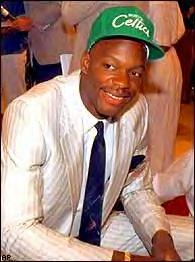NEED-TO-KNOW NEWS — For Friday July 25
[Scroll down for full week’s compendia]
WHAT YOU NEED TO KNOW TODAY — IN BRIEF
A Voice of Baltimore compendium, local and beyond. Your weekday morning look (with links) at late-breaking news, current events, and what will be talked about wherever you may go on Friday:

Off-duty New Jersey police officer Joseph Walker, left, shot and killed Maryland resident Joseph Harvey during a road-rage incident in 2013.
• STATE RESTS, DEFENSE BEGINS
IN FATAL I-97 ROAD-RAGE CASE
Off-duty New Jersey police officer Joseph Walker is on trial in Annapolis for first-degree murder for killing a 36-year-old Anne Arundel County man during a road rage incident last year.
Read More at: The (Annapolis) Capital
• RAY RICE SUSPENDED FOR TWO GAMES WITHOUT PAY
The Baltimore Ravens running back will miss the first two games of the 2014 season because of his off-season arrest for domestic violence.
Read More at: WBAL-Radio (1090AM)
• HOWARD STREET THEATER PROJECT BACKED BY BDC
The Baltimore Development Corp. voted Thursday to begin exclusive negotiations to sell a set of city-owned properties in the 400 block of North Howard Street to a group proposing to create a hub for small theater companies.
Read More at: Baltimore Sun
• FIVE CITY PROPERTIES TO BE MANAGED BY VILLAGE GREEN
The company, which is one of the country’s oldest apartment owner-operators, will manage a combined 694 units at five properties in the Baltimore area.
Read More at: Maryland Daily Record
• EX-OFFICER GETS $127K IN HARASSMENT LAWSUIT
A federal jury on Thursday awarded a former Maryland Transportation Authority police officer $127,000 after she alleged that she was sexually harassed by an instructor at the agency’s police academy.
Read More at: WBFF Fox45-TV | Maryland Daily Record









